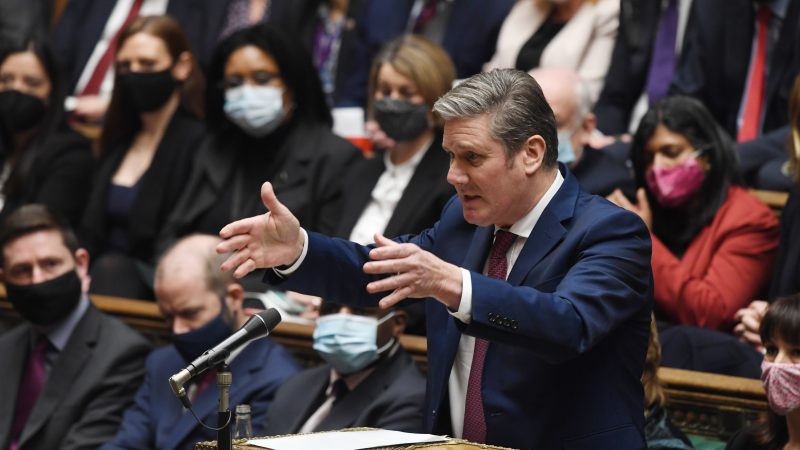
The problem with Boris Johnson’s carnival of lies and incompetence from a Labour strategist’s perspective is that it will end. It’s easy to deliver zinging one-liners about a “Z-list of nodding dogs” from the despatch box, but now that Johnson is going, the Labour leadership will be left with the task of setting out something resembling a vision for the country.
If Keir Starmer’s Brexit speech this week was anything to go by, the signs are not good. The speech was in many ways a symbol of his leadership so far. Having been elected on a hard-and-fast pledge to defend free movement – utilising his image as the voice of Remainers in Labour – on Monday, he went into a sealed room at the Centre for European Reform to announce that his promises mean nothing and that migrants’ rights were going under the bus.
Grainy mobile phone footage filmed by the select audience confirmed the lines that had been widely pre-briefed the night before, that “with Labour, Britain will not go back into the EU. We will not be joining the single market. We will not be joining a customs union”. And later, that “we will not return to freedom of movement to create short-term fixes”.
In other words, having spent the initial years of his leadership saying nothing about Brexit and proposing no alternative to the Tories’ favourite divide-and-rule project, Starmer has now confirmed that he will continue to say nothing and do nothing on the subject. Labour will retain the hardest possible Brexit arrangement, despite clear economic harm, and a growing majority of the population now thinking that leaving the EU was a mistake. A single market position might well have legs, but it is apparently laughable to suggest that Labour advocates a policy overwhelmingly backed by its membership and until recently regarded as a red line by much of the parliamentary party.
It would be churlish to deny that the Labour leadership has a plan. From refusing to oppose real-terms wage cuts and banning frontbenchers from RMT picket lines, to abstaining on the ‘spycops’ bill and the legalisation of torture committed by British troops abroad, to endorsing hard Brexit, Starmer’s invertebrate strategy has been a consistent feature of his leadership.
To an extent, this is nothing new – the ‘invertebrate strategy’ is the common-sense positioning for anyone seeking to perform a copy-and-paste job from New Labour – but when it comes to migration policy, it does give off a special kind of moral bankruptcy. As the government sets about criminalising the act of seeking asylum and inventing ever-more barbaric mechanisms to police our borders (its racist implications less a dogwhistle than a foghorn), Labour couches its limited criticism in terms of value for money and efficiency. Starmer’s loudest condemnation has been reserved for Priti Patel’s “incompetence” in stopping Channel crossings.
The ditching of free movement is particularly remarkable given its total separation from both principle and reality. As the Labour frontbench is fully aware, immigration has not gone down since we left the EU; free movement was never about numbers or whether migrants come, it was about their rights when they get here. Ending free movement is about a deregulating agenda, making people more precarious, and less likely to assert their rights or join a union. When you actually explain to people what a reciprocal free movement agreement would mean, a majority – and even a majority of Leave voters – support it when polled.
The picture is even clearer when it comes to the ‘cost-of-living crisis’. There is now overwhelming public support for price controls on foods and other basic goods and for a £15 minimum wage. Nationalisation of energy and rail has had majority support for decades. About three-quarters of the population now back free energy as a universal public service. And yet Labour backs none of this. It has focused instead on cutting VAT for energy bills, a windfall tax which the Tories have already implemented and vague noises about fairness.
But for advocates of the invertebrate strategy, none of this really matters. For them, what matters is convincing a narrow section of the media and political elite that, under a Labour government, things won’t change that much. Either consciously or subconsciously, their honest belief is that replaying the 1990s is Labour’s only path to power. Maybe they think it’s unfortunate that, in order to pursue this course of action, Starmer had to tell a blizzard of lies to Labour members in the 2020 Labour leadership campaign – but that’s life.
What’s different about this attempt to apply New Labour’s political strategy to the 2020s is that, without the zeitgeist or the originality, it is fantastically boring. Unlike Tony Blair, Starmer’s positioning comes across not as the zeal of a convert, but as dead behind the eyes.
There is an alternative, of course: a radical offer that clicks with the public mood on the cost of living, a basic level of moral hygiene on migration and human rights and an alliance that cuts across party lines to kick out a Tory Party dependent on an entrenched minority of the electorate. But all of that would involve having a spine, and this is the Labour Party in 2022. It’s a god-awful, braindead slog, but being disappointed would be your own fault.
Johnson’s resignation will put politics in flux and leave the field open for major policy shifts on Brexit and on the economy. Sooner or later, there will be an election. Maybe Labour could win it – but if it does, it will be in spite, not because, of Starmer’s strategy and style.




More from LabourList
‘Labour’s quiet quest for democratic renewal’
‘Labour promised to make work pay. Now it must deliver for young people’
‘Council Tax shouldn’t punish those who have the least or those we owe the most’